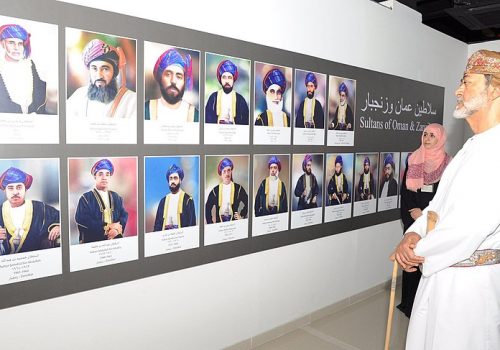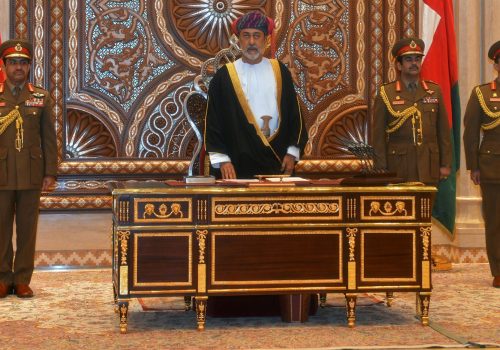The sultan of Oman’s new cabinet combines continuity and change
Sultan Haitham bin Tariq Al Said issued a series of royal decrees on August 18 appointing a new Council of Ministers, along with a number of governors, deputy ministers, and other senior officials. Sultan Haitham succeeded the late Sultan Qaboos upon the latter’s death on January 11. At the time of his accession, well-connected Omanis speculated that he would take his time before making any major changes in the government. Some suggest that the prolonged coronavirus lockdown in Oman since mid-March provided the new sultan the opportunity to prepare quietly and without significant pressure from elites as he pondered on the changes he wanted to make. Having decided the time was right, on August 18, Sultan Haitham issued royal decrees that set in place the widest-ranging changes in Oman’s senior leadership since Qaboos’ last major cabinet changes, which followed the Arab Spring-related unrest in 2011.
The most obvious adjustment is the much smaller number of ministers—nineteen compared to twenty-six in the previous Council. Furthermore, a number of ministries have been combined or consolidated. For example, the large manpower ministry, which previously wielded great power through its control of permits for foreign workers, has been consolidated into a new labor ministry, although the precise impact of this remains to be seen. Smaller ministries have also been combined or consolidated; the former heritage and culture ministry—where Sultan Haitham was minister for a number of years before becoming Sultan—was separated into a new culture, sports, and youth ministry, headed by the Sultan’s son Dhi Yazin bin Haitham, and a newly combined heritage and tourism ministry. Several new undersecretaries or heads of authorities were reportedly selected from Oman’s elected Shura Council for the first time.
The most notable changes in regard to Washington involve the replacement of several long-serving ministers by well-known and well-respected senior officials. At the foreign ministry, Yusuf bin Alawi bin Abdallah, the Arab world’s longest-serving foreign minister, was replaced by the ministry’s highly respected Secretary-General, Badr bin Hamad Al Busaidi. At the finance ministry, the long-serving Darwish Al Balushi was supplanted by the financial expert Sultan Al Habsi, who formerly served in a number of senior positions, including Secretary-General of the Supreme Council for Planning and head of the tax authority. At the commerce and industry ministry, Dr. Ali Al Sunaidy was succeeded by the dynamic former head of the Omani chamber of commerce and industry, Qais Al Yusuf, bringing an important private sector representative into the cabinet. Al Sunaidy is now the chairman of the General Authority for Special Economic Zones, with the bin Alawi and Al Balushi retired.
There are a number of other ministerial changes, but I focused on these three because the former ministers were well known internationally. While I was ambassador from 2016 to 2019, Sultan Qaboos generally included some combination of Minister bin Alawi, Minister Al Balushi, and Minister Al Sunaidy when receiving American or British senior officials in meetings and subsequent lavish official dinners. Now that the three are no longer ministers, it will be interesting to see whom Sultan Haitham includes when he receives senior visitors.
The new Council of Ministers also highlights a new dynamic in Omani royal family politics. While Sultan Haitham retained Qaboos’ role as prime minister, there is no doubt that the two Deputy Prime Ministers, his older cousin Fahd bin Mahmoud Al Said and his full brother Shihab bin Tariq Al Said, are close to him and will likely play important roles. Last spring, Sultan Haitham created the new position of Deputy Prime Minister for Defense Affairs for Shihab bin Tariq. Deputy Prime Minister Shihab bin Tariq’s new role overseeing national defense coincided with the retirement of former Minister Responsible for Defense Affairs Badr bin Saud Al Busaidi and Ministry of Defense Secretary General Mohammed Al Rasbi. In the new Council of Ministers, there is no Minister of Defense.
It is worth noting that in 2017, Sultan Qaboos created the positions of Deputy Prime Minister for International Affairs and the Sultan’s personal representative for Haitham’s half-brother, As’ad bin Tariq Al Said, but he was not listed among the new Council of Ministers and it is unclear if he retains an official role. Nonetheless, As’ad’s son, Taimur bin As’ad Al Said, the former deputy head of the Research Council, was appointed by Sultan Haitham as Chairman of the Central Bank’s board of governors. It is also noteworthy that Sultan Haitham appointed his own son, Dhi Yazin bin Haitham, as Culture, Sports, and Youth Minister. Sultan Qaboos married only briefly and had no children. Sultan Haitham’s August 18 appointments demonstrate, among other things, the importance he places on family.
Despite the many interesting changes which I have highlighted, I anticipate considerable continuity from the new Council of Ministers. A number of key ministers retained their positions, including Diwan of the Royal Palace Minister, Khalid Al Busaidi, Royal Office Minister, General Sultan Al Nu’mani, and former Oil and Gas Minister, Mohamed Al Rumhi, who now heads the renamed Energy and Minerals Minister.
Regarding Oman’s foreign relations, Sultan Haitham has already declared his intention to follow Sultan Qaboos’ much praised policy of moderation and mediation, a strategy for which Foreign Minister Badr Al Busaidi is a highly articulate advocate. But the Gulf is surrounded by multiple challenges and conflicts, such as COVID-19 and low oil prices, the ongoing war in Yemen, unresolved tensions with Iran, the Qatar rift, and now the fast moving normalization between Israel and Oman’s ambitious neighbor, the United Arab Emirates, for which Muscat quickly declared its support. The upcoming US presidential election in November and the possibility of a new administration with a very different set of policies toward the region is also part of the mix. With these royal decrees, Sultan Haitham has put his own highly competent people in place, as Oman prepares to cope with the challenges of the days ahead.
Ambassador Marc J. Sievers is a nonresident senior fellow for Middle East Programs at the Atlantic Council. Ambassador Sievers retired in 2019 as a career member of the senior foreign service, having most recently served as US Ambassador to Oman from January 2016 until November 2019.


